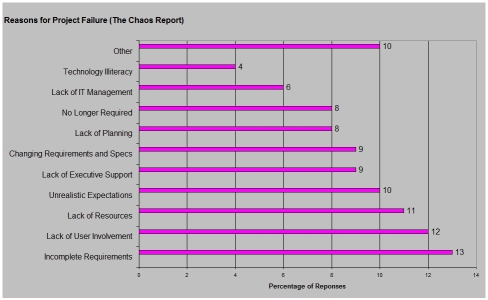
STOP PRESS: ''SWORD OF ALLAH' NOW AVAILABLE |
|||
Why Do Projects Fail? What is failure? This has several different meanings in the context of projects, depending on who you ask in the project environment. Some definitions might be:
What is the scale of failure? An oft-reported source is The Chaos Report (1995) by the Standish Group, although quite old now. Key Findings
Are these really reasons? For example, 'lack of IT management'. Is this a reason for failure? No. The real reason for failure is that:
What about 'Lack of Executive Support'? Same again.
Indeed, it can be argued that all project failure is due to lack of an effective working risk analysis and management plan. To be pedantic, a thorough Risk Analysis should include risks that the Risk Analysis may be incomplete, and that the Risk Management process may fail. Hopefully, the associated probabilities will be low. What if we have an effective Risk Analysis and Risk Management Process - can we still fail? Yes. Consider a situation where an unexpected event occurs. For example, company financial issues necessitate a budget cut. The only way that the project can be successfully delivered is that the scope is formally reduced (infrastructure, functionality, organisational scope and so on), assuming that efficiency cannot be increased to cover the shortfall (and if the project manager says that efficiency can be improved, then why was it not being done already)? This might still be seen as failure by some parts of the business if they don't get their bells and whistles. Why do projects REALLY fail then? The main reasons are
In summary, it is because clients do not always use properly qualified and experienced project and programme managers, and when they do, they don't always take the advise they are given. Still, that goes with the territory when you are a consultant.... Survey data/results © 1995 The Standish Group. All other material © 2010 Phil Marks
|
...Taking the 'tech' out of publishing, for authors who want to write!
© wavecrestpublications.com 2009-2016


